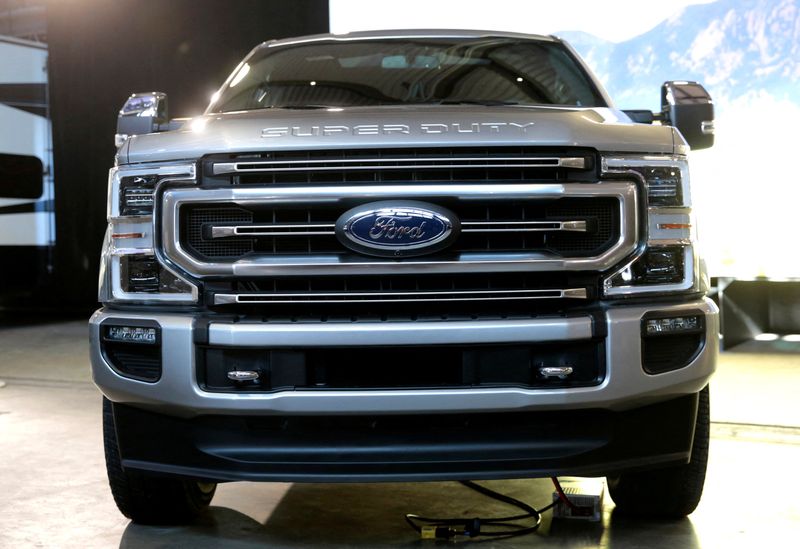By David Shepardson and Joseph White
(Reuters) - Trucks and sport utility vehicles with hood heights greater than 40 inches are about 45% more likely to cause fatalities in pedestrian crashes than shorter vehicles with sloped hoods, according to new research from the Insurance Institute for Highway Safety.
Prior studies have shown SUVs and pickups are linked to higher fatality risks in pedestrian crashes. But the new study focused on the risks posed by vehicles with hoods taller than 40 inches using data from nearly 18,000 crashes.
Tall, squared-up hoods are signatures of some of the best-selling and most profitable vehicles sold in the United States such as the Ford (NYSE:F) Super Duty pickup, the Cadillac Escalade and other large SUVs.
The rise in pedestrian deaths has outpaced the increase in overall U.S. traffic deaths since the easing of pandemic lockdowns.
The number of pedestrians killed in 2021 jumped 13% to 7,342, the highest since 1981, while the number of people on bicycles killed rose 5% to 985, the highest since at least 1975, the National Highway Traffic Safety Administration said.
Since reaching their lowest point in 2009, pedestrian deaths have increased 80% and account for 17% of all traffic deaths.
The Insurance Institute, an arm of the U.S. insurance industry, has no regulatory authority. But its studies are influential in the industry and with regulators at the National Highway Traffic Safety Administration.
The IIHS study found that vehicles that are tall and blunt, such as a large pickup truck, are 43.6% more likely to cause death in a collision with a pedestrian. Vehicles with tall and sloped hoods are 45% more likely to cause a pedestrian fatality, while medium-height vehicles with blunt front ends, such as a Mazda CX-9 SUV or a Chevrolet Colorado pickup, are nearly 26% more likely to kill a pedestrian, based on the Institute's analysis of crash data.
"Automakers can make vehicles more pedestrian friendly by designing vehicle front ends that are lower and more sloped. The National Highway Traffic Safety Administration can consider evaluations that account for the growing hood heights and blunt front ends of the vehicle fleet in the New Car Assessment Program or regulation," the IIHS study said.
U.S. vehicle fuel efficiency standards administered by NHTSA have encouraged automakers to build larger vehicles. The bigger the vehicle, the lower the fuel efficiency target it has to meet.
U.S. Transportation Secretary Pete Buttigieg has called the rise in traffic deaths "a crisis." The Biden administration this year allocated $800 million to infrastructure improvements aimed at improving vehicle and pedestrian safety.
